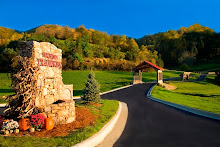American chestnuts, that is.
Mountain Traditions is working with Mars Hill College and the American Chestnut Foundation to grow 200 seedlings on our property to plant in area forests later this year. Woody Ammons, the community manger, is an avid conservationist and a member of the Foundation. With Woody's involvement with the Foundation and Mountain Traditions' ties to Mars Hill College, it was natural for Woody to offer a perfect spot at Mountain Traditions for the blight-resistant chestnut seedlings to be planted.
"My family has always been about saving trees and conserving our natural resources," Woody proudly explains. "It was the right thing to do for us to help with this pilot program. We're proud to be a part of the American Chestnut Foundation project to re-introduce the Great American Chestnut back into the mountains of Western North Carolina."
The American Chestnut Foundation is working with several local groups to bring back this great tree species to its once prolific majesty of of more than 50 years ago. These mighty trees where abundant then. They provide food and shelter to local wildlife and fuel and income to Appalachian Mountain residents. During the middle 1900s, an Asian blight - an exotic fungus - virtually wiped out the American chestnut from our mountain landscape.
For more than 26 years the American Chestnut Foundation, along with scientists from the US Forest Service, have been creating a blight-resistant strain of chestnut by cross-breeding the Chinese chestnut with the American. The result is a blight-resistant hybrid species that is 94 percent American chestnut.
For the past couple of years the Foundation has been responsible for planting more than 1,200 seedlings in "secret" national forests in North Carolina, Virginia and Tennessee. More than 500 more seedlings are expected to be planted in 2010.
By crossing the Chinese chestnut with the American, the goal of the Foundation is to "develop a breed of tree that grows like the American chestnut but resistant to blight and other fungus that destroys these trees and other species as well."
Bryan Burhans, president and CEO of the Foundation, explained in a newspaper article in the Asheville Citizen-Times last fall that the current project is the "evaluation stage" to study whether the new genetics is strong enough to reforest the country with American chestnuts. The paper further quoted Burhan, "We believe that these restoration efforts will serve as a model for future efforts to restore this native species."
The pilot project could takes up to 15 years before it is determined a success and full-scale restoration efforts begin. But scientist are encouraged so far.
"If successful, this chestnut restoration project could represent one the most important conservation success stories in the history of the forest service," reported Stacy Clark, a research forester with the US Forest Service's Southern Research Station. "This could provide hope for other tree species decimated by exotic pests."
Mountain Traditions is doing its part to help in the effort. Woody and his brother Jud Ammons have always been mindful stewards of the land. Jud Ammons, a builder and real estate developer for more than 40 years, would move a road to save a majestic tree. Or plant 10,000 trees on a 600-acre farmland and wait for 15 years before developing a golf course among those trees. When Jud purchased the 400-acre property on Broomstraw Mountain in Madison County, just minutes from Mars Hill and downtown Asheville, he never doubted that nature would play a vital role he envisioned for Mountain Traditions, a traditional mountain community that maximizes casual living while minimizing its environmental impact.
Detailed information about the test plantings and future aspirations for a large-scale restoration of the American chestnut species can be found at www.fs.fed.us/r8/chestnut. The website also features photos of recent tree growth, video of the monitoring process and historic information about the American chestnut.
For more information about Mountain Traditions, visit our website www.mountaintraditionsnc.com.
Subscribe to:
Post Comments (Atom)



1 comment:
Great blog post! Lots of information...and very interesting!
Post a Comment